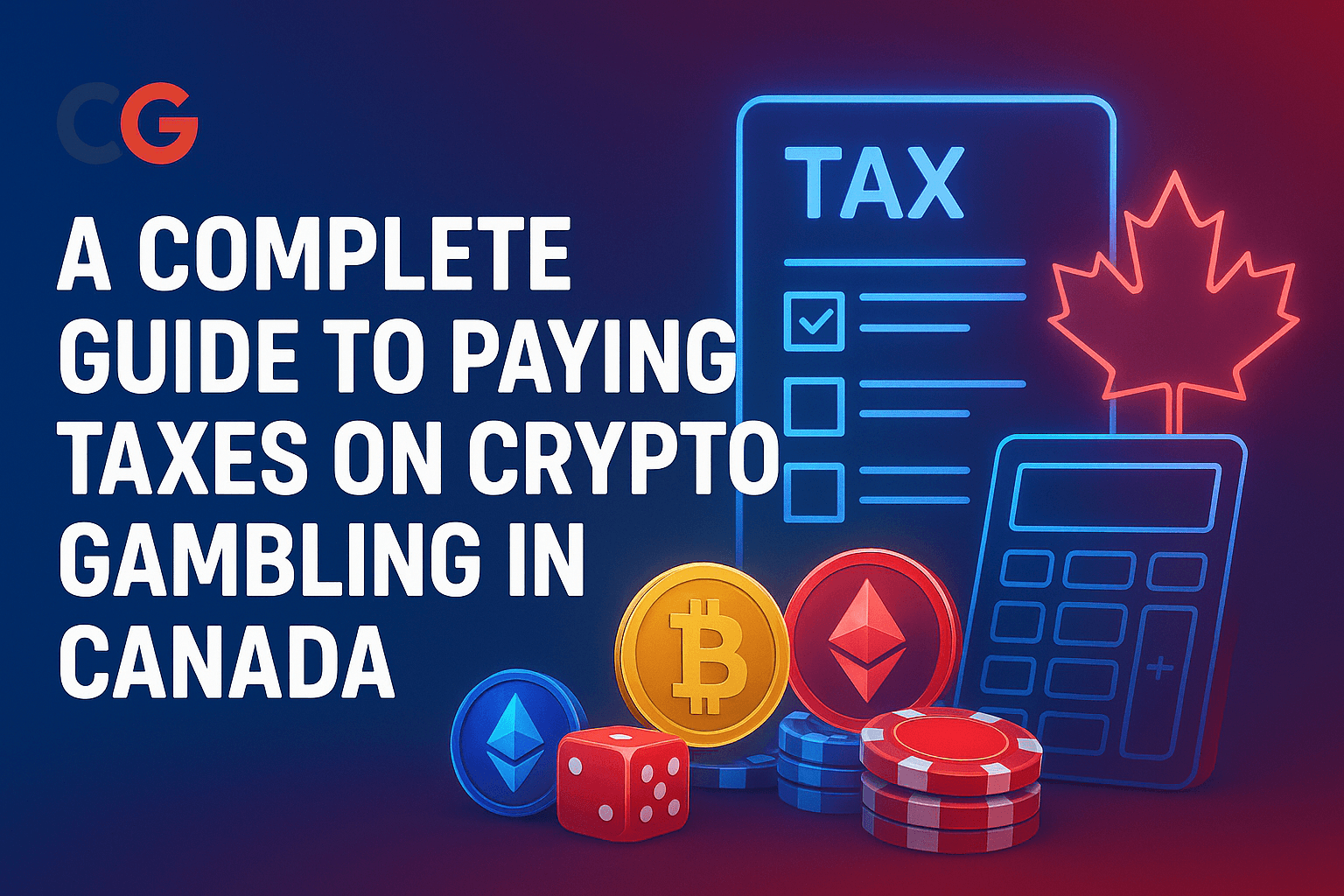A Complete Guide To Paying Taxes On Crypto Gambling In Canada
Crypto gambling in Canada is booming, but taxes can be tricky. This guide explains how the CRA taxes winnings, whether as capital gains or business income, how to report on your tax return, common mistakes to avoid, and the 2025 tax rates you need to know.

A Complete Guide To Paying Taxes On Crypto Gambling In Canada
Crypto gambling has gained massive traction in Canada. Thousands of players are using Bitcoin, Ethereum, and other digital assets to place bets online every day. According to a 2023 survey by the Ontario Securities Commission, about 13% of Canadians own cryptocurrency, a figure that has nearly doubled since 2020. The trend of cryptocurrencies has increased, and with it, the crypto gambling industry has also seen a major rise. In such a condition, questions surround taxation and proper regulation, especially when gambling winnings and cryptocurrency gains overlap.
The Canada Revenue Agency (CRA) has clear rules and guidelines. However, sometimes these regulations are misunderstood, leading to confusion about how gambling and cryptocurrency transactions are taxed. If you are confused about the workings of this industry and taxation, then you have come to the right place. This blog covers everything you need to know about taxes on crypto gambling in Canada.
How the CRA Treats Cryptocurrency
Learning how the CRA treats cryptocurrency is very important in understanding how they deal with crypto gambling and winnings. Cryptocurrency is not considered legal tender in Canada. Instead, the CRA treats it as a commodity under theIncome Tax Act. This means that using, selling, trading, or even gifting crypto is taxable.
Each transaction involving crypto requires valuation in Canadian dollars at the time of the transaction, known as the fair market value (FMV). That said, the CRA considers factors such as the frequency of transactions, the intent behind them, and the degree of organization in carrying them out to decide whether to treat the profits as capital gains or business income.
For instance, an occasional player who wins and cashes out once or twice a year may face capital gains obligations, while someone actively betting and cashing out crypto daily could fall under business income rules and might be obliged to pay more in taxes.
Are Crypto Gambling Winnings Taxable?
Taxation in Canada has several criteria for gambling. First and arguably the most important factor is whether the player is a recreational or a professional player. Casual gambling winnings in fiat currency are not taxed because they are considered windfall gains.
However, things are different with cryptocurrency. If you win Bitcoin or another cryptocurrency token at a gambling site, the initial receipt of the crypto might not trigger tax immediately if you are a casual gambler. But the moment you sell, trade, or use that crypto, you create a disposition under Canadian tax law. At this point, the CRA will calculate if you have a gain or loss based on the difference between the value when you won the crypto and the value when you disposed of it.
However, if you are a professional player, you need to be more careful about the taxes; all crypto winnings are fully taxable as income because gambling forms part of their business activities. Read More:The Secrets to Spotting a Provably Fair Casino in Canada
When Does Crypto Gambling Become a Business in Canada?
The CRA examines whether gambling is a casual pastime or a business. If gambling becomes a systematic, frequent, and profit-driven activity, it is classified as business income.
Here are some of the criteria that determine if the crypto casino games are considered a business:
- How often do you gamble
- Whether you rely on it as your main source of income
- The strategies you use
- Whether your approach resembles a commercial enterprise.
For example, a casual player who occasionally places bets on a crypto casino may not be considered a business. Still, someone who spends several hours daily betting across platforms with consistent profit motives could be categorized as a professional gambler.
How to Calculate Taxes on Crypto Gambling
Calculating taxes on cryptocurrency gambling is typically considered a complex process that requires meticulous record-keeping and attention to detail. The players need to note the price of the crypto at the time of winning. The idea behind this record is that the fair market value (FMV) of the crypto winnings at the time of receipt becomes the cost base. When players later sell the exchanged crypto, the difference between the proceeds and their cost base determines their taxable gain or deductible loss.
Moreover, if your gambling is considered casual, only 50% of the capital gain is included in your taxable income. If it is regarded as a business activity, 100% of the profit is taxable. For instance, if you won 0.5 BTC when it was worth $12,500 CAD and later sold it for $20,000 CAD, your taxable capital gain would be $7,500 CAD, of which $3,750 CAD is added to your income. If you are classified as a business gambler, the full $7,500 CAD is subject to tax.
How to Report on Your Tax Return
Reporting the tax return is also an important process that depends on various factors. Like any other process, reporting the tax highly depends on whether you’re taxed as a casual player or a professional.
For most Canadians who gamble occasionally, the CRA typically treats them as casual players. In this case, any profits made from selling or trading cryptocurrency used in gambling should be reported as capital gains or losses on Schedule 3 of the T1 General Income Tax and Benefit Return. For example, if you used Bitcoin for gambling and later sold it at a higher price than when you acquired it, that profit must be recorded under the Capital Gains section.
On the other hand, individuals who gamble regularly with the intention of earning a consistent income may be classified by the CRA as professional or business gamblers. In such cases, gambling income must be reported on Form T2125 Statement of Business Activities. This also allows you to deduct certain allowable expenses directly related to your gambling activities, such as platform fees, internet costs, or even equipment used to facilitate frequent play.
Regardless of your classification, the CRA requires gamblers to maintain comprehensive records. CRA requires gamblers to maintain records of:
- Date and type of each transaction.
- Number of units of crypto.
- Value in Canadian dollars at the time.
- Wallet addresses, exchange slips, and receipts.
Common Mistakes to Avoid in Taxation When Dealing with Crypto Gambling
Taxation in crypto gambling is a relatively complex process compared to traditional online casino gambling. This means that this process can lead gamblers and players to make mistakes that can later come with serious repercussions. That said, here are some of the common mistakes to avoid in taxation when dealing with crypto gambling.
- Ignoring crypto-to-crypto transactions. Swapping one cryptocurrency with another is considered a crypto transaction that can be taxed. For instance, swapping ETH for BTC is taxable in case there is an increase in the value of the total asset.
- Failing to track FMV at the time of winnings leads to an incorrect cost base.
- Treating all winnings as tax-free can also pose a big mistake. Disposals of crypto are still taxable.
- Not keeping detailed records, as CRA can request transaction history up to 6 years later, and the inability to present it can result in financial or legal consequences.
- Misclassifying income, Business income rules apply if gambling is frequent and systematic.
Deductions, Losses & Offsetting of Taxation in Crypto Gambling in Canada
There are many cases when any income or transaction from the crypto casino platform can be considered as deductions, losses, or offsetting. Here are some of the major cases:
- Capital losses can offset capital gains, but not employment income or other types of income.
- Business losses (for professional gamblers) can reduce taxable income.
- Some expenses, like internet bills or platform fees, may be deductible if gambling is treated as a business.
Tax Rates and Numbers to Know in Crypto Casino in 2025
The crypto winnings are also taxed under the personal income tax bracket. Here are the federal personal income tax brackets for 2025:
- 15% on first $55,867
- 20.5% on $55,868 – $114,750
- 26% on $114,751 – $177,882
- 29% on $177,883 – $253,414
- 33% on income over $253,414
For capital gains, only 50% of the gain is taxable. For business income, 100% is included in taxable income.
Conclusion
The bottom line is that crypto gambling in Canada has several factors to consider with taxation. For instance, while casual winnings may not be taxed directly, the moment you dispose of your crypto, you may face capital gains obligations. With that said, all winnings may be considered business income for professionals or those who gamble systematically.
No matter how you play, you should always comply with the rules and guidelines of the CRA for a safe and good gambling experience. If you knowingly or unknowingly make a mistake with taxation in gambling, you might face financial and legal penalties down the road. So, it is very important to understand everything about taxes on crypto gambling in Canada.
If you want to learn more about Crypto gambling regulations in Canada, consider visiting Crypto-Gambling.CA. Also, if you're going to engage in licensed and regulated crypto casinos in Canada, consider playing with the listed casinos on our page. Play onBC.GAME,Wild.io,Wiz.io,Run4Win, andFairspin are platforms that give some of the best welcome bonuses.









